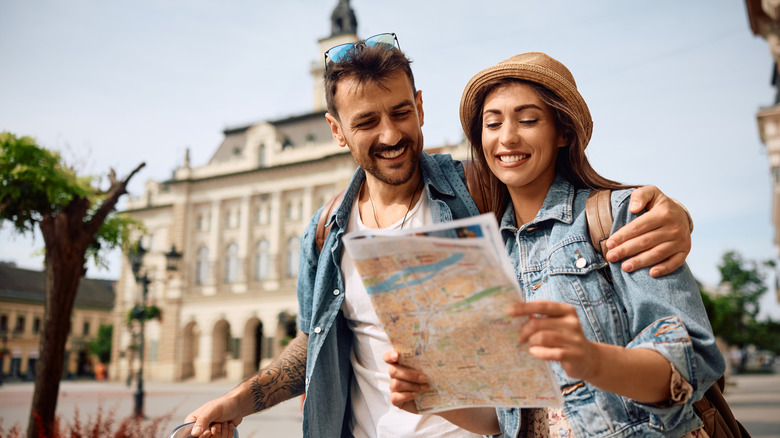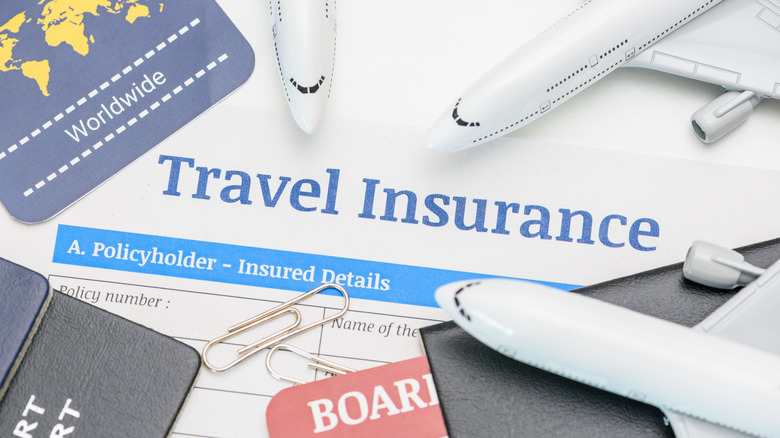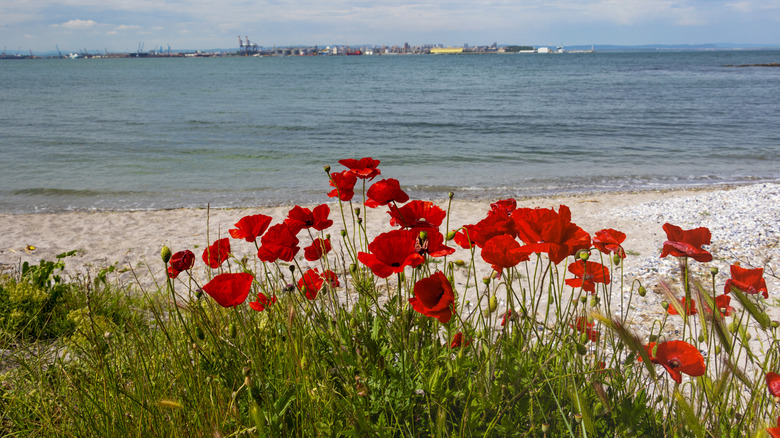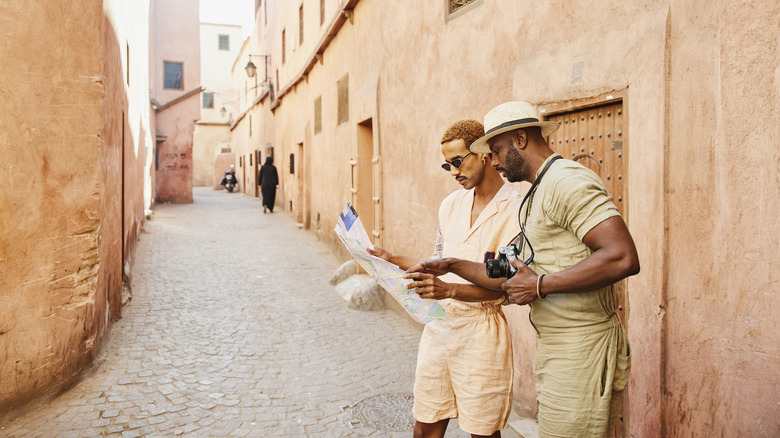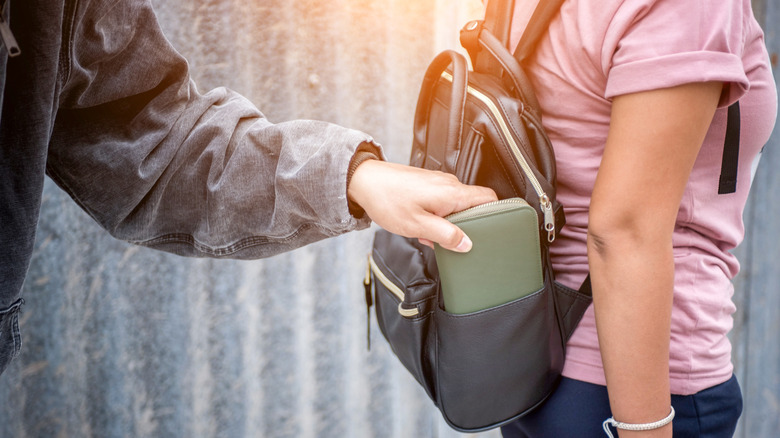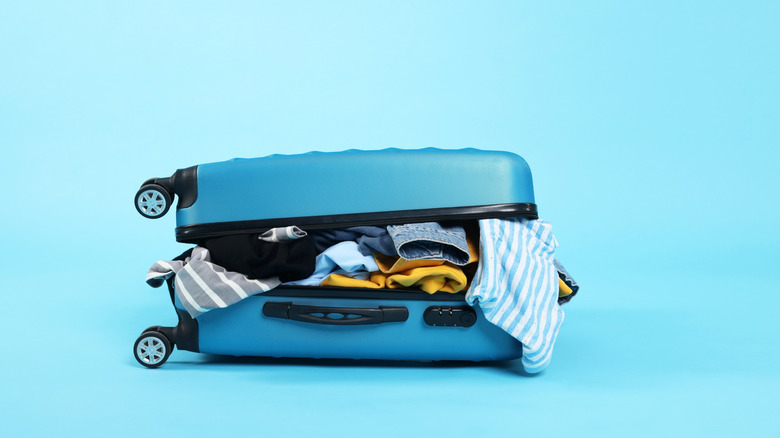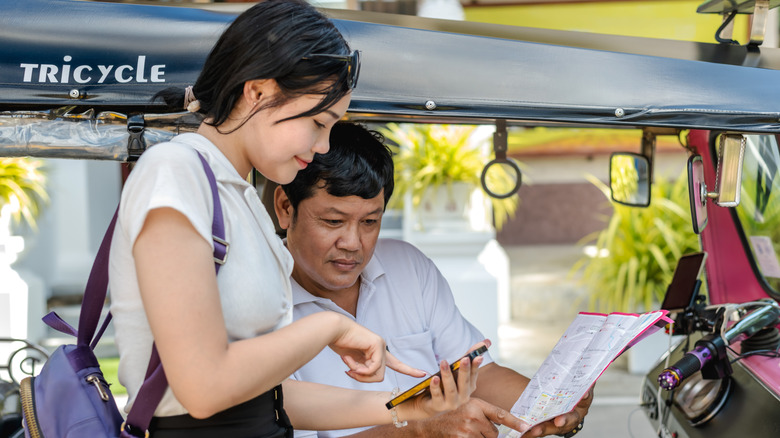Old-School Travel Tips That Are Timeless For A Fool-Proof Getaway
Anyone who has ever looked back on the history of travel has surely noticed how much things have changed over time. Crossing the oceans used to be a miserable affair, with voyages taking weeks or even months and little or no consideration of comfort. Then came the ocean liners: the RMS Britannia, Kaiser Wilhelm der Grosse, and the ill-fated Titanic. An ever-increasing emphasis on luxury and speed was the watchword of the day. Passengers were still, at times, at the mercy of the waves, but at least they could cross oceans in style. A brief dalliance with zeppelins ended in a post-Hindenburg abyss, but by 1945, transatlantic passenger flights were a thing. The year 1952 saw the first-ever commercial jet flight, paving the way for overseas vacationing as we know it today.
Technology refused to stand still, and today, the way we interact with our environment changes at a pace our forebears would have been ill-equipped to comprehend. Still, there are times when old school tricks of the trade have a role to play. In some cases, such hacks complement the array of options we have at our disposal. In others, they are an actual improvement. Veteran travelers such as myself are more than happy to live in both worlds. While making full use of all that modernity throws our way is second nature, a healthy dose of respect for some old-school gems never led anyone astray.
Print things out
Noting that the introduction of smartphone technology has had an enormous impact on the way we travel is far from an astute observation. Complicated ticketing philosophies were reduced to a swipe-of-the-phone satisfaction. Chance-encountered restaurants fell victim to on-the-fly rating checks. The hotel concierge found itself reduced to a port of last resort. Phones can bark out directions and translate on the fly. Armed with your beloved sidekick, you can transfer money in milliseconds, wander off at will, and find your way back to your group without having to endure a panic attack. Pre-arranged rally points were serious business back in the day, but now it's all so modern. What could possibly go wrong? Well, several things, really.
In what is sure to become a repeated refrain, cell phones are fantastic accompaniments until the precise moment when they are not. Batteries are of ever-diminishing utility; those unable to recharge often find themselves carrying around an overpriced paperweight. Top-rated locations that lack cell service are more common than you'd think. A stolen phone is identity theft on steroids; a lost phone is pure misery. Such trials are only amplified when abroad, and this is not just related to technology failures, either.
Losing your passport overseas sucks in so many ways that it's surprising there isn't an adjective for it. The solution is to return to basics. Passports should be photocopied lest the trip to the nearest embassy yields an unscheduled, three-week extension of your stay. Travel insurance, tickets, visas, and hotel reservations; they all need backups. The days of remembering critical phone numbers are well and truly over; we've outsourced that skill. When traveling, anything stored electronically should be printed out and kept in a separate, secure location. Yes, even your mom's telephone number.
Carry actual money
The adage that cash is king has never been less true than it is today. The physical value of actual coinage lasted millennia before gradually giving way to de facto promissory notes. The digital age took things one step further; in theory, few of us need to handle the physical stuff. In practice, things are less clear-cut. The familiar caveat applies. What's the next step if something happens to your phone? True, cards act as a physical backup, but while that is a constant of most vacations, it's certainly not the case with them all. The more rural the area, the less likely it is that you'll be able to swipe a card to get hold of that bizarre souvenir you crave.
There is also the question of converting money on the go via an ATM. Even if you manage to find one in a remote location, there is a good chance that hidden fees will stack up. Dynamic Currency Conversion rates can put a serious dent into attempts to keep costs down via well-researched budget travel hacks. Turning dollars into local currency at cash machines also often comes with a cost warning. Unsurprisingly, it favors the provider at your expense.
Even in places where electronic transfers are common, cash is sometimes a superior option. Discounts for paying with money crop up just about everywhere. Purchasing foreign currency before you leave is also advisable, and timing your purchase with an eye on currency fluctuations is a tip all by itself. Meanwhile, learning to keep money secure is another must. Carry only enough to meet your immediate needs. Any extra can be stored in a hotel safe or carried as easy-to-cancel traveler's cheques. These can be quickly replaced if stolen, provided you take the time to record their serial numbers.
Take out travel insurance
Vacations begin at home. Once a destination has been selected, dozens of tasks must be completed. Some, such as choosing a hotel or creating lists of must-see attractions, are fun. Others, like learning about single-trip insurance and when to use it, can be a drag. It sometimes feels like an unnecessary expense. Spoiler alert, it isn't.
To begin with, in some cases, travel insurance is compulsory, as certain countries deny entry to the uninsured. In such situations, the next flight home is at your expense. Even when this is not the case, securing travel insurance is a good habit to get into. It's not all about notions of impending disaster. True, medical emergencies happen. Europeans traveling to the U.S. expecting the same level of healthcare they get at home may be in for a rude awakening. Repatriation is also a significant issue. A death in the family? An injury severe enough to put the vacation on ice? Any sudden, unexpected reasons that require a trip home can quickly turn into the stuff of nightmares without a safety net in place.
But there are many less dramatic reasons for insurance. Lost luggage can ruin a vacation before it starts. Delayed or cancelled flights have a similar effect. With days booked off for work and hotels paid in advance, a refunded ticket from the airline is far from a silver bullet. Still, not all policies are born equal. You should, for example, avoid buying insurance on trip-booking sites. Check the fine print and be transparent about expected activities. Winter sport vacations require specialist policies. The same is true for any other activities that might be considered risky.
Travel off-season
During the first quarter of 2025, some 300 million people traveled internationally for tourism, per UN Tourism. According to World Population Review, France topped the list of most-visited nations, with Spain, the U.S., and China quietly nipping at its heels. Since travel broadens the mind, such numbers are encouraging. The increasing democratization of the industry is most assuredly a good development. However, there are downsides to this increased traffic.
For instance, while Prague is filled with unreal attractions, it is so congested with stag do events over the summer that the council banned late-night pub crawls. A gondola ride should be on your Venice bucket list, but the city is sinking due to the sheer biomass of visiting tourists. Meanwhile, some European beaches have become so overcrowded that local authorities have decided to close them entirely during the summer months. Traveling off-season mitigates such issues.
To start with, off-season vacations tend to be much cheaper affairs. During the so-called shoulder season, flights and hotels drop their rates by as much as 40%. Nor is the loss of fine weather a given. Places with perfect year-round climates exist, as do cities with humidity so high that you'll lose weight just thinking about them. Avoid events that occur during the rainy season like the plague. And sure, the cost savings and crowd-avoiding benefits evaporate during school holidays. But with those two caveats in mind, a low-season break is well worth a punt.
Take a map, and keep your phone hidden
The rise of phone theft is a growing concern, and in most major cities, criminal gangs have honed their skills to perfection. They know when to strike and which models offer the best resale value. Worse, they will snatch phones while in unlock mode and keep them that way. A seasoned criminal with full access to your data is indeed something to fear. This is why you should only use your phone when necessary while wandering around a strange city. Enter the paper map.
Yes, maps mark people as tourists, and yes, Google Maps and GPS are a thing. The trouble is that staring at your phone also makes you look like a tourist — one holding something worth stealing. The screen is also a distraction, keeping it in front of you as you walk robs you of sights worth viewing. Maps are far more likely to be consulted and then put away. They also never run out of batteries at an inopportune moment.
Smartwatches that display directions from a more secure location on your wrist work almost as well, but are still a distraction. Meanwhile, game-changing smart glasses that put navigation and translation in front of your eyes are still locked in the early adopter phase. Nonetheless, they look almost as stealable as a cell phone. If you absolutely must stay glued to your phone, try using an old, tatty cover. It might just fool the gangs into mistaking your Pro Max for something else.
Try to learn some phrases
Phones offer a plethora of real-time translation options; smart glasses are also starting to get in on the act. However, the familiar limitations persist. Phones run out of power. Signal strength can be patchy, and then there are pesky roaming fees to contend with. Such charges vary from network to network, but you can rack up some serious bills if you overuse your phone.
Then, there is the human element to consider. An inability to say thank you without reaching for a cell phone might come across as a little lazy. It's also a tad inconvenient and increases the risk of being snatched. And while few people expect tourists to be able to debate philosophy in their second language, struggling through a few phrases usually acts as something of an icebreaker. Locals may laugh at your pronunciation, but it's usually done in a good-natured manner.
It's certainly true that you may not need to learn French when visiting France, and no, you don't need to be a seasoned polyglot to navigate the streets of Tokyo, either. The act of self-learning, however, is a reward in itself. Language and culture have always been intertwined. With just a few short phrases memorized before travel, you can bring yourself closer to both.
Anti-theft propositions
Few things can ruin a vacation more assuredly than the theft of a treasured possession. Viscerally, it just hits harder than a mere loss. No system is foolproof, of course, but a few simple tips to help you avoid theft go a long way toward minimizing risks.
Money belts are an absolute no-brainer. If pickpockets had figured out a way to wriggle some cash out of them, they'd have done it by now. Anti-theft bags take things one step further. They are usually made of cut-resistant material, come laden with several secret pockets, and have lockable zippers. They can be traced — via Apple tags or similar devices — but the bag's principal strength lies in discouraging thieves in the first place. Pickpockets want easy targets. Sticking to well-lit areas and being mindful not to flash around expensive tech seals the deal as far as personal security is concerned. As always, only carry what you need, and have a contingency plan in place should the worst occur.
Pack light
Pack light. No, seriously, pack lighter than that. There's an old travel technique known as the 80/20 rule that is as relevant today as it ever was. The basic concept states that you only use 20% of your possessions 80% of the time. Such items are all you should ever take with you. Clothing is, of course, part of the equation — more on that shortly — but these items are only one part of a broader picture.
First up are travel documents. Essential, yet should still only take up less than 5% of the allotted space. Next come items related to your daily ablutions. Toothbrush? Check. Hairbrush? Check. Vitamins, medication, and makeup? Check, check, check. Learning to love packing cubes is a revelation. Utilizing Ziplock bags is an actual epiphany. Leave your laptop at home along with any other bulky items you can live without. Tablets are great for shedding space-devouring books from your shoulder bag, but e-readers are even better. Light and cheap, a lost or stolen e-reader isn't the disaster that an iPad Pro might be.
Once done, you'll be left with a sprightlier, more chipper version of your traveling self. Mad dashes to the terminal gates will suddenly require less hyperventilation. Taxi-to-hotel rides may morph into money-saving walks filled with discovery. The nimble traveler truly is a thing of beauty.
Choose your clothing wisely
Having established an 80% rule for packing, we find ourselves in the enviable position of making some serious wardrobe concessions. What to take, what to leave behind. The answers to such questions can make or break a vacation. Weather can, for example, be fickle, but that heavy winter coat might be best left at home. Layering is a time-honored way of staying warm if things turn out chillier than expected. Certain garments wrinkle somewhat less obviously than others, and there are effective ways to pack them to avoid creases.
The variable of allotting 20% to 50% of available space to clothes is also situational. Hiking through the Scottish Highlands requires more robust attire than sitting on a beach in Majorca. The former is a license to pack your favorite poncho, the latter, a mandate to leave it behind.
None of which means you need to compromise on your appearance just to avoid a little shoulder strain. Pack to ensure you will look your best on vacation. Selecting items that effortlessly complement one another into a travel capsule, a microcosm of clothes that defines your style, is very much the way to go. A vacation should lead to a renaissance of sensible footwear, all-purpose summer hats, and easy-to-clean garments that still pack a punch.
Talk to the locals
Travel guides and Google searches are one thing, but local knowledge is an often underutilized resource. Trade secret: Most people are happy to help. Sure, there are times when rush-hour New Yorkers might not want to help you find the most underrated pizza. And yes, the people of Marrakech are as standoffish as anecdotes suggest. But outside such anomalies and, as you leave urban sprawls behind, humanity's gregarious instincts take hold, which is of great benefit to the itinerantly minded. Locals are the best tour guides. They can help you avoid tourist traps in Copenhagen, teach the finer niceties of Japanese etiquette, or send you off on an unexpected, exploratory tangent.
Language barriers, where they exist, are all part of the fun. You'd be surprised how easy it is to communicate with people under such conditions. Certain gestures are universally recognized. Pointing at signs and looking confused is generally well-understood. A tourist rubbing their stomach will soon find themselves well-fed. One rubbing their fingers together to indicate that funds are low will no doubt be fed cheaply. Failing that, phrase books retain their old-school appeal, and a quick leaf through one often yields positive results.
Meanwhile, don't assume that English is the only option. A German insisting they don't know any English might still be able to communicate in French. Spanish is a much-loved language in Europe, with some 28 million non-native speakers spread across the EU. Your second language, if you have one, is probably more useful than you think.
Trust your instincts
Lastly, when technology fails, when online sources are out of date, or during those moments when things feel a little off, remember the golden rule: Trust your instincts. You may already have your wits about you at dangerous vacation spots, perhaps, while in the often-treacherous Cairo traffic, or when visiting the hot springs of Wyoming that have claimed lives.
But it is in more mundane locations that travelers must be extra alert. Even the friendliest cities in Europe have their share of crime. Pickpockets infest transportation hubs. Aggressive touts target tourists with overpriced tickets. Even before travel, scam websites have been known to trick would-be tourists out of their money. Fake tickets, phishing scams, and fraudulent rentals. It's all there.
So, avoid those back alleys, shortcuts, and double-check your URLs. Oh, and phone hotels ahead of time to confirm your booking; they won't mind. Because vacations are about fun and relaxation, staying safe is implied within that mandate. It should always be your number one priority.
